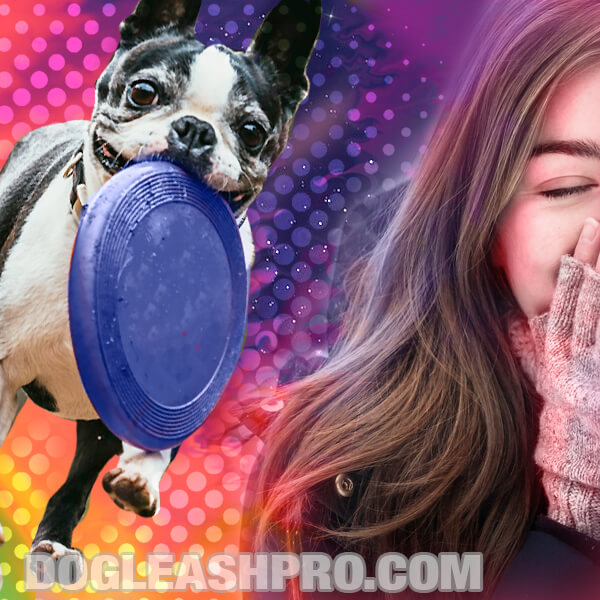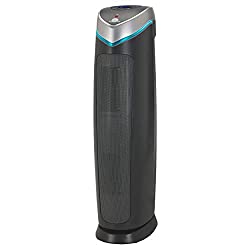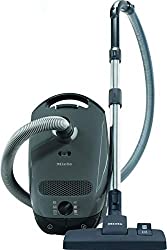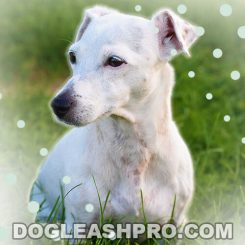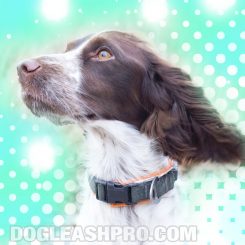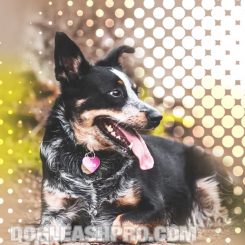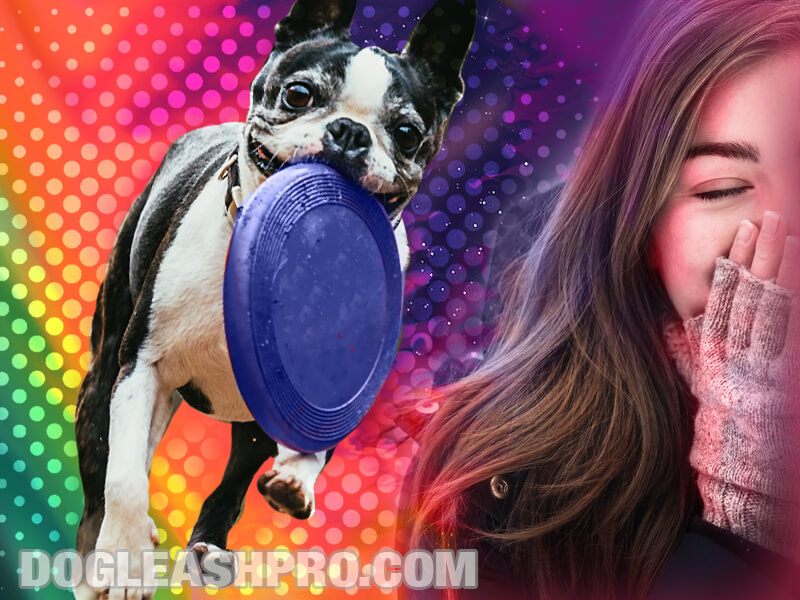
If you’re considering owning a Boston Terrier but have dog allergies, you may be wondering, “Are Boston Terriers Hypoallergenic?” Boston Terriers are small, gentle, warm-hearted, and friendly dogs that make them suitable for small homes and apartments. But can their fur, dander, and saliva cause you mild to severe allergic reactions? Here’s the short answer first before we dive into more details below.
Are Boston Terriers hypoallergenic? No, Boston Terriers are not hypoallergenic dogs. In fact, no dog is 100% hypoallergenic. Although Boston Terriers shed minimally and don’t shed as much as a Labrador Retriever, Siberian Husky, or German Shepherd, they do produce and shed a fair amount of dander. Due to this, Boston Terriers are not considered hypoallergenic dogs.
In this guide, we’ll discuss in detail why Boston Terriers are not considered hypoallergenic dog breeds. We’ll also explain what it means to be a hypoallergenic dog and come up with a list of allergy-free dogs you could consider if you’re looking for one.
Table of Contents
Is a Boston Terrier hypoallergenic?
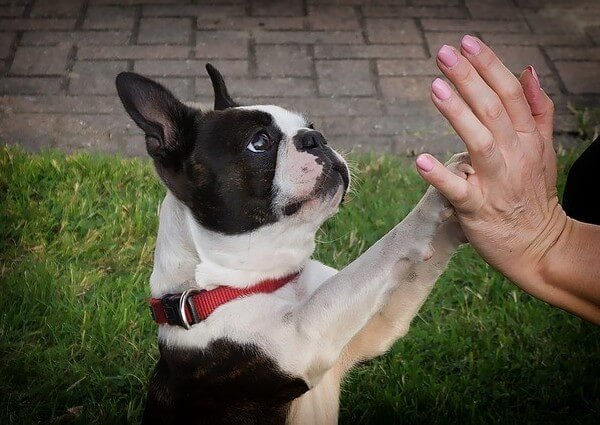
No, a Boston Terrier is not a hypoallergenic dog. To fully understand why they are not hypoallergenic, we need to take a closer look at this dog breed, including their coat type and what it means to be a hypoallergenic dog.
What is a Boston Terrier?
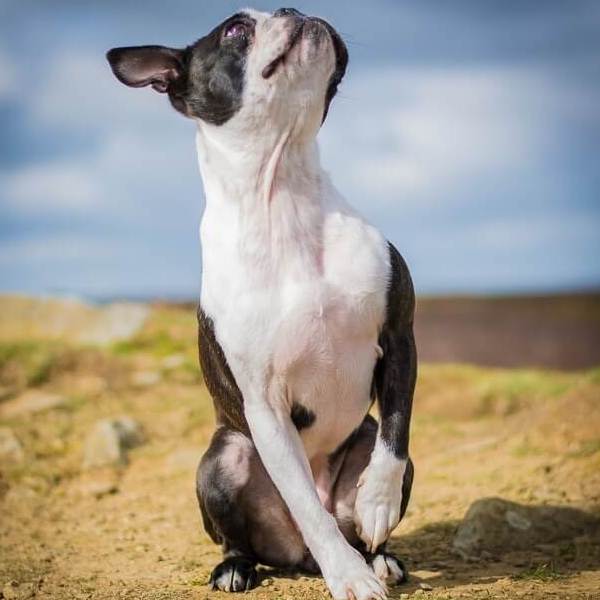
The Boston Terrier is one of America’s favorite dog breeds. In fact, Boston Terriers usually come in black and white coat colors, which resembles that of a tuxedo. This physical appearance on top of their affectionate, calm, friendly, and gentle temperament earned them the nickname, “American Gentleman.”
Boston Terriers are small dogs and they are also very popular in the state of Massachusetts. The Boston Terrier was chosen as the official state dog of Massachusetts since they are native to this state.
English White Terrier + English Bulldog = Boston Terrier
This dog breed was a mix of the English White Terrier and the English Bulldog. The first generation of the Boston Terriers was bred in Boston, Massachusetts in the late 1800s, which is why they’re called “Boston” Terriers or Boston Bull Terriers.
They have a hint of French Bulldog DNA in them and you can definitely tell when looking at their cute and adorable faces.
In 1893, the Boston Terrier was officially recognized by the American Kennel Club (AKC). This makes the Boston Terrier a truly American breed.
Great for city dwellers and apartment
Due to their small size, many city dwellers enjoy having a Boston Terrier or two in their apartments or homes. One of the advantages of having a Boston Terrier, especially if you have a family with young and older kids, is that this dog breed is great with kids and other pets in the house.
Early training and socialization is key
Make sure that your Boston Terrier is trained and socialized properly from an early age. If you have young kids, this is especially important since Boston Terriers can be a bit boisterous.
Training should be pretty easy since this dog breed is intelligent, a fast learner, and loves to please its owners. They love learning, getting mentally stimulated, and enjoy challenging agility training. This makes house training that much easier if you have Boston Terriers.
However, Boston Terriers can be stubborn at times so it’s crucial to practice patience and use positive reinforcement during training.
You might be interested in: Are Pitbulls Hypoallergenic?
Boston Terriers size
When it comes to the Boston Terriers’ size and height, they stand between 15 to 17 inches tall (at the shoulder). This is equivalent to 38.1 to 43.18 centimeters.
Boston Terriers weight
Boston Terriers are small dogs that weigh anywhere between 12 to 25 pounds or 5.44 to 11.34 kilograms.
What is a hypoallergenic dog?
A hypoallergenic dog is a dog that’s less likely to cause or trigger allergic reactions in people. It’s important to note that when a dog is considered a hypoallergenic dog, it doesn’t mean that they are 100% allergy-free.
Keep in mind that no dog is 100% hypoallergenic and it’s not just the dog’s hair or coat that causes allergic reactions, it can also be their dander (skin cells), saliva, and even urine. In fact, some hairless dogs can still trigger allergic reactions because it is their dander that causes the most canine allergies in people.
According to the VCA Hospital, there are certain dog breeds that are less likely to cause allergies in people. They stated that,
“Breeds that shed less are less likely to make their owners sneeze because the dander and saliva remain on the hair that stays in the hair follicle. Less shedding means less allergens in the house. In general, dogs that shed less have longer hair…But even hairless breeds produce dander.”
Essentially, a hypoallergenic dog is a canine that sheds minimally (or less fur) and produces less dander and saliva. Remember that there’s no such thing as a dog that does not shed at all. All dogs shed to some degree.
So this brings us back to our question, Are Boston Terriers Hypoallergenic?
Although Boston Terriers have a single layer coat and sheds less than a dog with multiple layers of coat, they do have short and straight coats that shed throughout the year.
A short and straight coat that sheds throughout the year means that their hair isn’t trapping any dander or saliva. Instead, you have both hair and dander falling off and floating all-around your home and dander is one of the main triggers of dog allergy in people.
Luckily, Boston Terriers are less likely to drool so it’s mostly the hair and dander that trigger allergy sufferers and are the main culprit.
Although they are considered low-shedders, they do shed more than usual at least twice a year when the seasons change. This is called seasonal shedding.
Do Boston Terriers shed?
As we can see, yes, Boston Terriers do shed throughout the year.
Many people who are allergy sufferers often seem to think that a low-shedding dog is the best dog for them because they think low-shedding dogs are hypoallergenic. This is completely false.
That’s because all dogs shed, some less than others. However, even low-shedding dogs can and will shed more when seasons change such as in the fall and spring. During these two seasons, the Boston Terriers will blow out their coat. They will grow their summer or winter coats. In addition to seasonal blowout, some dogs also shed all year round.
Do Boston Terriers shed a lot? Boston Terriers do shed more than usual twice a year when the seasons change, which is normal and common.
Do Boston Terriers shed a lot of hair? Boston Terriers shed a lot of hair when seasons change such as in the spring and late fall. During these two seasons, they shed more fur than usual because they are growing in new coats for the upcoming cold or warm seasons.
Other than that, Boston Terriers shed their fur lightly throughout the year.
Boston Terrier shedding
Your Boston Terrier’s coat goes through four different phases:
- Anagen phase. The first phase is when the new hairs are growing.
- Catagen phase. The second phase is when the new hairs complete their growth phase and stop growing.
- Telogen phase. The third phase is when the dog’s hairs are dormant and are simply attached to the hair follicle.
- Exogen phase. The last phase is when the dead and loose hair is at the end of its lifespan and starts to shed. Since Boston Terriers have thin and short coats, their fur falls out very easily.
Year-round shedders like the Boston Terriers have hair that rotates between the 4 stages. When you take a look at their coat, it always appears to be uniform.
Boston Terrier allergies
If you’re thinking about getting a Boston Terrier, be aware that this dog breed actually suffers from allergies too. While they may not sneeze like us, you can tell when they have allergies by taking a look at their skin.
If they are constantly scratching their skin, it could be a sign of itchy and dry skin. We highly recommend that you speak with your vet on what you can do to alleviate the itchiness or use dog-friendly shampoos to keep their skin moisturized and healthy.
When dogs constantly scratch their skin, it causes tiny skin cells or flakes to fall out. Over time, those dead skin cells or dander will build up all over your floor, carpet, and even furniture. When both the hair and the dander are disturbed, they can float all around your home which can trigger allergies in some dog owners that are sensitive to dog allergy.
Due to the breeding process, Boston Terriers suffer from many other health issues and many of these health problems contribute to their skin issues and increase the likelihood of having flaky and dry skin.
Boston Terrier grooming
To keep your dog’s hair and dander under control, you’ll want to use a brush or pet grooming mitt. We highly recommend that you groom your Boston Terriers by brushing their coat regularly.
Remember that it’s not just the hair that triggers allergic reactions in dog owners. It is also the dander and the protein that sticks to the dander and hair that can cause allergic reactions in pet owners.
You can also find these proteins in their saliva and urine. When dogs lick their fur and skin, that protein from their saliva makes its way onto their fur and skin.
Can you be allergic to Boston Terriers?
One of the most frequently asked questions is whether people can be allergic to Boston Terriers and the answer is yes, you can be allergic to Boston Terriers.
The reason is that you can actually be allergic to the proteins that are present in the Boston Terriers’ fur, dander, saliva, and even urine.
What’s scary about allergy is that you may not have it today, but tomorrow, you could develop it. It’s not as predictable as you think.
In fact, pet allergies are pretty common here in the US. There are many pet owners that are allergic to their dogs. According to the American College of Allergy, Asthma, and Immunology (ACAAI), about 10 million people are actually allergic to their pets.
And allergies are annoying since it can happen suddenly or overnight without any advanced notice or symptoms. Our bodies can tolerate the allergens for many years and then overnight, our bodies can decide that a particular allergen is a threat.
What results is our immune system going into overdrive mode in order to attack these allergens that they see as threats even if the allergens are not harmful.
When you become allergic to your dog’s dander, fur, saliva, or urine, your eyes may start to water and your nose may start to run, causing you to sneeze. That’s because your brain is telling your body to make more mucus.
Allergic reactions can range from mild to severe. In some cases, you may have itchy red skin because your body produces histamine.
In worse cases, your body may go into anaphylactic shock in which your blood pressure suddenly drops, your blood vessels constrict, your airways narrow due to your throat swelling, and all of this blocks your breathing or causes difficulty breathing. This is both fatal and deadly.
What are Boston Terriers allergic to?
Unfortunately, there are cases when Boston Terriers are allergic to their owners. We mentioned above that they are prone to many health issues, including allergies. While we can be allergic to our dog’s dander, the reverse is also true when it comes to our Boston Terriers.
Our Boston Terriers can be allergic to human dander, pollen, perfume, mold, dust mites, and smoke.
If you plan on owning a Boston Terrier, be sure to keep this in mind and sign up for doggy health insurance.
How to avoid allergic reactions to dog hair: 7 Tips
Fortunately, there are many ways dog owners can avoid canine allergy besides picking a dog breed that is low-shedding or does not drool as much.
Here are 7 tips to avoid allergic reactions to your dog’s hair, dander, saliva, and urine:
1. Choose good quality and healthy food for your dog
The food that our dogs eat affects their overall health. Feeding our Boston Terriers healthy, well-balanced, and good quality dog food will help them maintain a strong immune system so that they stay active and healthy.
If you’re feeding your Boston Terrier new food, make sure to introduce the food slowly and gradually. Right after, you’ll want to observe them carefully and check for any adverse reactions. This way, you’ll know if they are allergic to certain food.
If you’re not sure, we highly recommend that you speak with your vet. Your dog’s vet will perform a series of tests to find out which food items your Boston Terriers are allergic to.
2. Use an air purifier
If you own a dog or two or three, you can expect their fur and dander to float all-around your home. This is normal but it can make your nose itch and your eyes water, especially if you are sensitive to dogs or have dog allergies.
The good news is that with the right air purifier, it can help extract dander and dog hair from the air. This way, you won’t be breathing that in. It’s best to get an air purifier with a HEPA filter because that helps to trap harmful particles such as dog dander, pollen, dust mites, and even smoke.
Since we have two dogs of our own, we rely on the air purifier. When we started using the air purifier, we noticed the difference immediately. This is the one we use throughout our house:
3. Invest in a good vacuum cleaner
Investing in a powerful vacuum cleaner can do wonders in your home. I’ve been using this vacuum cleaner for almost 5 years now and it is still worth every penny. I decided to use this one because it’s very durable and quiet!
Long gone are the days when I would turn on the vacuum cleaner and my dogs would get startled, scared, and run away.
I wanted to use a vacuum cleaner that would do a great job both on the carpet and on the hardwood floor and this Miele vacuum cleaner was the answer since it has a combination floor head. I enjoy its maximum maneuver function and am able to get underneath furniture.
Best of all, it’s not just for carpets and floors. There are six different suction power settings specific to which surface I needed to clean. For instance, my Labrador Retriever likes to hang out near the window because he likes to look outside and watch people. As a result, he would get his fur all over my curtains.
With the Miele vacuum cleaner, I’m able to use different upholstery tools to get rid of the fur on my curtains. Best of all, I like that the Miele vacuum cleaner comes with a 7-year manufacturer warranty on motor and casing and a 1-year manufacturer warranty on labor and parts.
My Miele vacuum cleaner is still like new after 5 years and I haven’t had any problem with it so far.
4. Wash your dog’s bed and blankets on a regular basis
Depending on which dog breed you own, the amount of dog hair and dander that’s shed weekly varies. If you have a dog that sheds a lot, you can expect a lot of doggy dander on their doggy bed and blanket.
You’ll want to wash their blanket and bed at least once a week to help control and minimize the amount of hair and dander on their bed and carpet. It’s also a good idea to vacuum or mop the carpet or floor around the doggy bed and blanket.
This will ensure that their bed and blanket are clean and fresh.
For me, washing my two doggy beds is quite a hassle. So, I opted for easy to clean, elevated dog beds that are lightweight and durable. The HDPE fabric of the elevated dog beds makes it easy to clean because all I have to do is simply hose it down. They are very comfortable and promote air circulation around your dogs.
5. Routinely brush your dog’s coat
By brushing your furry friends daily or once a week with a high-quality brush or a grooming mitt, it helps to control the amount of fur flying all around your house or apartment. When you brush your furry friend’s coat, the loose or dead fur is removed and contained.
During the shedding seasons like fall and spring, it’s extremely helpful if you brush your four-legged friends’ fur every day.
List of allergy-friendly dogs
If you suffer from canine allergies or are sensitive to dog allergies, here is a list of dog breeds to consider that are less likely to trigger allergic reactions in people.
- Afghan Hound.
- American Hairless Terrier.
- Bedlington Terrier.
- Bichon Frise.
- Chinese Crested.
- Irish Water Spaniel.
- Maltese.
- Poodle.
- Portuguese Water Dog.
- Schnauzer.
- Shih Tzu.
- Wheaton Terrier.
- Yorkshire Terrier.
So, are Boston Terriers Hypoallergenic?
As we can see from this guide, Boston Terriers are not hypoallergenic dogs. Although they are low shedders, they shed all year round and shed more than usual twice a year during the spring and late fall seasons.
Some may think that low-shedding dogs mean the dogs are hypoallergenic, but this is not true. Depending on the dog’s coat type and length, it can also cause allergic reactions. Since Boston Terriers have short and straight coats that shed year-round, they’re not able to trap dander or saliva.
If you plan on having a Boston Terrier, you can expect their fur and dander throughout your home.
DISCLAIMER: THIS WEBSITE DOES NOT PROVIDE MEDICAL ADVICE
The information, including but not limited to, text, graphics, images and other material contained on this website are for informational purposes only. No material on this site is intended to be a substitute for professional veterinary advice, diagnosis, or treatment. Always seek the advice of your veterinarian or other qualified health care provider with any questions you may have regarding a medical condition.
Resources:
https://en.wikipedia.org/wiki/Boston_Terrier

With over five years of specialized experience as an animal writer, my expertise lies in dog nutrition, health, behavior, grooming, and training. I am dedicated to delivering helpful and informative content that caters to the well-being of our furry friends. My primary goal is to empower pet owners with knowledge and ensure our canine companions thrive in health and happiness. In my free time, I love volunteering at local dog rescue centers.
